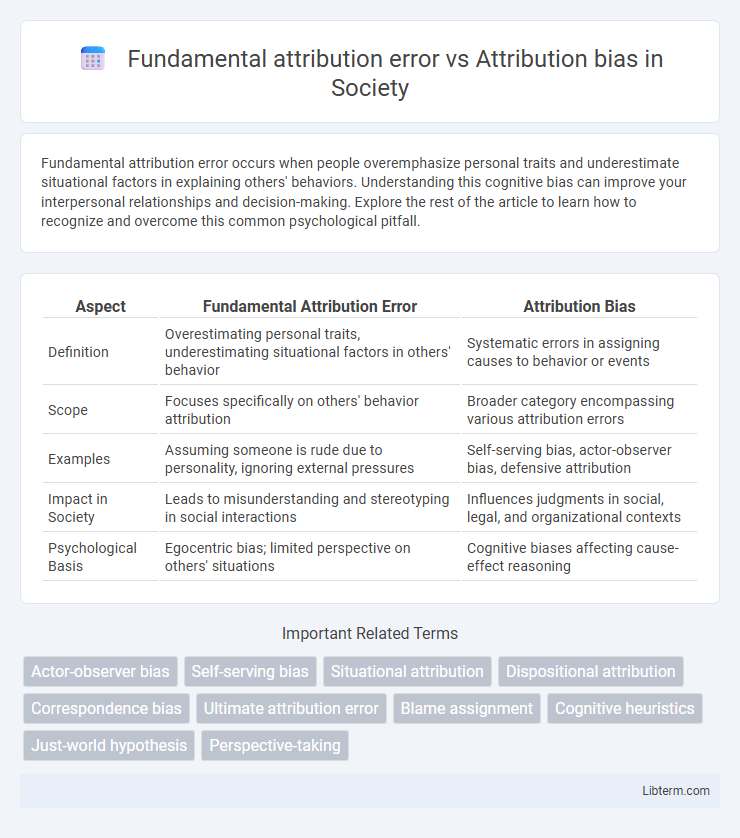Fundamental attribution error occurs when people overemphasize personal traits and underestimate situational factors in explaining others' behaviors. Understanding this cognitive bias can improve your interpersonal relationships and decision-making. Explore the rest of the article to learn how to recognize and overcome this common psychological pitfall.
Table of Comparison
| Aspect | Fundamental Attribution Error | Attribution Bias |
|---|---|---|
| Definition | Overestimating personal traits, underestimating situational factors in others' behavior | Systematic errors in assigning causes to behavior or events |
| Scope | Focuses specifically on others' behavior attribution | Broader category encompassing various attribution errors |
| Examples | Assuming someone is rude due to personality, ignoring external pressures | Self-serving bias, actor-observer bias, defensive attribution |
| Impact in Society | Leads to misunderstanding and stereotyping in social interactions | Influences judgments in social, legal, and organizational contexts |
| Psychological Basis | Egocentric bias; limited perspective on others' situations | Cognitive biases affecting cause-effect reasoning |
Introduction to Attribution Theories
Fundamental attribution error refers to the tendency to overemphasize personal characteristics and underestimate situational factors when explaining others' behavior. Attribution bias encompasses various systematic errors in how people interpret causes of behavior, including self-serving bias and actor-observer bias. Attribution theories explore these cognitive processes, explaining how individuals infer motives and assign responsibility in social contexts.
Defining Fundamental Attribution Error
Fundamental attribution error refers to the tendency to overemphasize personal characteristics and underestimate situational factors when explaining others' behavior. Attribution bias encompasses a broader range of cognitive distortions, including fundamental attribution error, self-serving bias, and confirmation bias. Understanding fundamental attribution error is crucial for accurate social perception and avoiding misjudgments about others' actions.
Understanding Attribution Bias
Attribution bias encompasses a range of cognitive errors individuals make when interpreting causes of behavior, with fundamental attribution error being a specific type where people overemphasize personal traits over situational factors. Understanding attribution bias is crucial in psychology to recognize how biases affect social perception, decision-making, and interpersonal judgments. Research indicates that mitigating attribution bias can improve empathy, reduce prejudiced attitudes, and enhance conflict resolution in social and organizational contexts.
Key Differences Between Fundamental Attribution Error and Attribution Bias
Fundamental attribution error specifically refers to the tendency to overemphasize dispositional factors while underestimating situational influences when explaining others' behavior. Attribution bias encompasses a broader range of cognitive biases affecting how people attribute causes to events, including self-serving bias, actor-observer bias, and fundamental attribution error itself. The key difference lies in the scope: fundamental attribution error is a specific type of attribution bias focused on others' behavior, whereas attribution bias covers various distortions in causal reasoning across different contexts.
Common Examples of Fundamental Attribution Error
Fundamental attribution error often occurs when individuals attribute others' behaviors to their personality traits rather than situational factors, such as assuming a colleague is lazy for missing a deadline without considering external pressures. Attribution bias encompasses a wider range of errors, including self-serving bias and actor-observer bias, which distort understanding of causes behind actions. Common examples of fundamental attribution error include blaming a driver for reckless behavior while ignoring road conditions or assuming a student's poor test performance stems from lack of effort rather than external stressors.
Common Examples of Attribution Bias
Fundamental attribution error occurs when individuals attribute others' behavior to internal traits rather than situational factors, commonly seen when judging someone's rudeness without considering external stressors. Attribution bias encompasses various patterns, such as self-serving bias, where people credit their successes to internal factors and blame failures on external circumstances. Common examples of attribution bias include blaming a driver's aggression on their personality while ignoring heavy traffic or praising a colleague's success solely as talent without acknowledging teamwork or luck.
Psychological Mechanisms Behind Attribution Errors
Fundamental attribution error occurs when individuals disproportionately attribute others' behaviors to internal personality traits rather than situational factors, reflecting a cognitive bias rooted in the salience of personal dispositions. Attribution bias encompasses a broader range of errors, including self-serving bias, where people attribute successes to internal factors and failures to external circumstances, driven by the need to maintain self-esteem. Both errors stem from psychological mechanisms like egocentric bias, limited information processing, and motivational influences that shape how people interpret and assign causal explanations to behavior.
Impact of Attribution Biases in Everyday Life
Attribution biases, including the fundamental attribution error, significantly shape interpersonal interactions and decision-making by skewing how individuals interpret others' behaviors, often attributing actions to personality rather than situational factors. These cognitive distortions can lead to misunderstandings, prejudice, and conflict in social, professional, and cultural contexts, hindering effective communication and collaboration. Recognizing and mitigating attribution biases is crucial for improving empathy, reducing stereotyping, and enhancing social harmony across diverse environments.
Strategies to Reduce Attribution Errors and Biases
Strategies to reduce fundamental attribution error and attribution bias include increasing awareness of situational factors influencing behavior and promoting empathy by considering external circumstances. Training programs that emphasize perspective-taking and encourage critical thinking about initial judgments help mitigate automatic internal attributions. Using structured decision-making frameworks and seeking feedback from diverse viewpoints further enhances accuracy in attribution processes.
Conclusion: Why Understanding Attribution Matters
Understanding attribution is crucial because it shapes how individuals interpret others' behavior, influencing social interactions and decision-making accuracy. Fundamental attribution error highlights the tendency to overemphasize personal traits while neglecting situational factors, whereas attribution bias encompasses various systematic distortions in assigning causes. Recognizing these differences promotes empathy, reduces misunderstandings, and improves conflict resolution in both personal and professional contexts.
Fundamental attribution error Infographic

 libterm.com
libterm.com